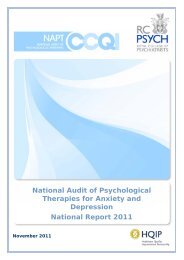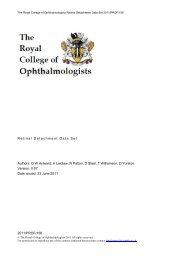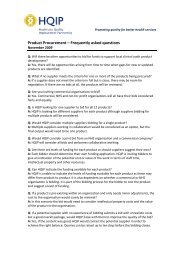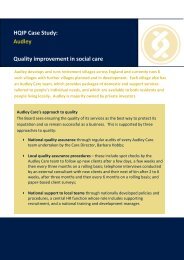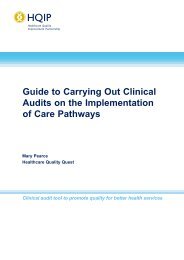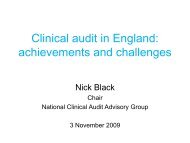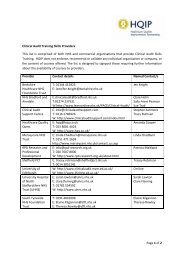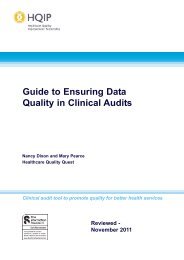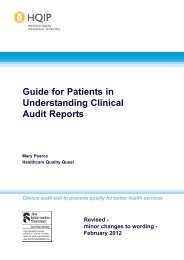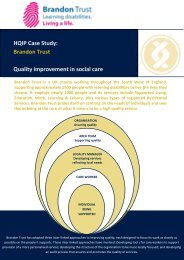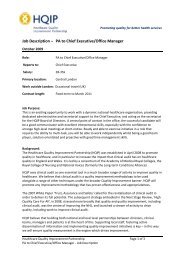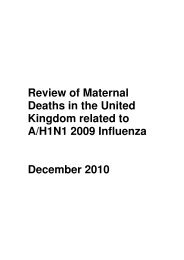Good Governance Handbook - HQIP
Good Governance Handbook - HQIP
Good Governance Handbook - HQIP
Create successful ePaper yourself
Turn your PDF publications into a flip-book with our unique Google optimized e-Paper software.
<strong>Governance</strong> principle 4: <strong>Governance</strong> and management<br />
Directors may in addition to their governance responsibilities also have a portfolio of<br />
management responsibilities, these being the duties to manage and operate the<br />
enterprise from day-to-day. Directors need to separate themselves from their<br />
management role when they are acting as the controlling mind of the organisation<br />
and are acting as overall guardian to stakeholder interests. The origin of the word<br />
‘director’ is from the word ‘steer’, while that of the word management is ‘to hold in<br />
the hand’.<br />
<strong>Governance</strong> concerns:<br />
• Vision – being certain why the organisation exists in the first place – its<br />
purpose and what difference it intends to make.<br />
• Strategy – the planned means by which the organisation delivers the vision.<br />
• Leadership – how the organisation is able to deliver the strategy over time<br />
• Assurance – that the organisation does what it says it will do and behaves in<br />
the manner it has agreed.<br />
• Probity – that the organisation meets standards of openness and<br />
transparency, acts with integrity and in good faith. In the public sector, taking<br />
note of the Nolan principles of public life.<br />
• Stewardship – that the organisation is responsible with resources, especially<br />
other people’s resources (such as credit).<br />
The purpose of governance is to ensure better decisions. We separate governance<br />
from management by the role each has in decisions. Management makes (or crafts)<br />
decisions. By this we mean management identifies an issue, gathers and analyses the<br />
data, identifies and weights options consults and comes up with recommendations.<br />
Directors in their governance role then take decisions, and move at that point from<br />
being responsible to accountable.<br />
Why it is important<br />
<strong>Governance</strong> works on the separation of powers, so that those running the<br />
organisation day-to-day are internally accountable to themselves and others who<br />
have a focussed governing role. This ensures that the broader interests of the<br />
organisation, investors, owner and other stakeholders are balanced and that the<br />
organisation is not run in the interests of those staffing it. Those governing an<br />
organisation are additionally charged with ensuring that they recruit in a team most<br />
able to run the organisation successfully, to meet strategic aims and in the interests<br />
of stakeholders. The board has privy knowledge of the organisation that is unique and<br />
so is the best system for ensuring that the performance of management meets the<br />
requirements of all stakeholders.<br />
It is now generally recognised that a corporate governance structure with separate<br />
representatives in the roles of chair and chief executive "resolves inherent conflicts of<br />
interest and clarifies accountability -- the chair to the shareholders and the chief<br />
executive to the board". (Northwest & Ethical Investments commenting on RIM,<br />
Times 14 6 11))<br />
www.good-governance.org.uk 11



